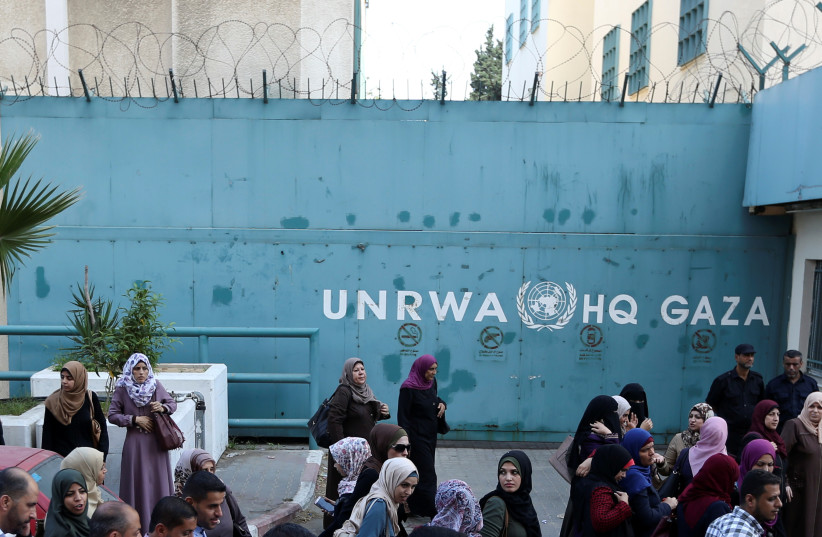On Monday, May 15, the United Nations (UN) will mark Israel’s 75th anniversary with a PLO-sponsored event commemorating Nakba – demonizing the creation of the Jewish state as a catastrophe – with the United Nations Relief and Works Agency (UNRWA) Commissioner-General Philippe Lazzarini as a featured speaker.
It is not surprising that the PLO would partner with UNRWA to commemorate Nakba because although UNRWA claims to be a neutral and independent humanitarian agency, in fact, it has become a political advocacy tool for the Palestinians who consider UNRWA to be the main political witness to their cause.
Take the case of Riad Mustafa Nimr (a.k.a. Abu Hadi), a teacher at UNRWA’s al-Manara school at the Nahr El Bared camp in northern Lebanon, who publicly endorsed a gruesome mass murder by Palestinian terrorists at a Jerusalem synagogue and posted a video on Facebook of terrorist Ibrahim Nabulsi’s funeral – responsible for attacks on Israeli soldiers and civilians in the West Bank – hailing him as a pure soul.
After UN Watch exposed Nimr’s social media incitement in a 100-page investigative report published jointly with IMPACT-se, UNRWA suspended Nimr only to reinstate him two weeks later under pressure from its Palestinian constituents, as well as Hamas, Islamic Jihad, Hezbollah and Fatah.
So, what happened?
In reaction to our report, UNRWA issued a statement confirming its commitment to upholding UN values and humanitarian principles, including neutrality and zero-tolerance toward hatred and the promotion of violence. A few days later, Palestinian news sites widely reported that UNRWA had suspended Nimr on March 17. So far, so good.
However, the suspension prompted angry strikes and protests by the UNRWA staff unions and committees in the Nahr El Bared camp, including a three-day strike in which UNRWA teachers pulled their students out of class. The strikes paralyzed UNRWA operations, shutting down all services except healthcare.

The reports quoted Palestinian sources, including the UNRWA Teachers Union, who cast Nimr as a patriot, disciplined for sharing patriotic publications on social media. They called UNRWA’s actions arbitrary and accused it of submitting to blackmail by Zionist institutions.
The Teachers Union also described UNRWA as “the main political witness to our cause.” Other activists said UNRWA should always remain a defender of the people’s rights, i.e., it should be a political advocate for the Palestinians.
THE PALESTINIAN factions behind the strikes issued a statement demanding that UNRWA not align itself with the policy of the Zionist enemy, and insisting that UNRWA must stand up to the daily crime against our people in our beloved homeland, Palestine, meaning to advocate for the Palestinian cause. They threatened that if UNRWA did not immediately retract its decision the strike will spread to all camps in Lebanon.
Hamas, Islamic Jihad and other terrorist factions also pressured UNRWA. The pressure clearly had an effect. According to one source, UNRWA Lebanon director Dorothy Klaus was very cooperative after learning that the situation in the camps had become unbearable and may be a prelude to many things.
In the end, after three weeks of strikes and protests, UNRWA reinstated Nimr on April 6. The UNRWA Teachers Union thanked UNRWA for its cooperation to end the issue, and reiterated its position that UNRWA is a living international witness to the issue of Palestinian refugees.
UNRWA is bound by humanitarian principles
As a UN humanitarian agency, UNRWA is bound by humanitarian principles, which include humanity, neutrality, impartiality, and independence. This means that UNRWA cannot take sides in political controversies and its work should be autonomous from the political objectives of the population it serves.
When Palestinians consider UNRWA to be their witness and political advocate in the international arena and when UNRWA caves into pressure from the people it serves to reverse a legitimate disciplinary action, UNRWA ceases to be a humanitarian agency and becomes instead a political advocacy tool for the Palestinians.
The United States is UNRWA’s top donor, contributing $340 million (NIS 1.2 billion) annually. When President Joe Biden resumed funding the agency, his administration insisted that UNRWA was committed to neutrality, meaning zero tolerance for racism, discrimination, and antisemitism.
The case of Riad Mustafa Nimr raises serious questions, not only about whether UNRWA is committed to neutrality but also about whether it is even capable of serving as a neutral and independent humanitarian agency. This should be a matter of utmost concern to US taxpayers.
To its credit, Congress has taken up this issue, including in bipartisan legislation that would create new State Department reporting to prevent US tax dollars from funding incitement and antisemitic content at UNRWA, as well as bills now pending in both the House and Senate to cut funding to the agency.
Donors like the US who seek to provide humanitarian assistance to people in need must ensure that their principles are not compromised in the process. They must demand accountability and compliance with international humanitarian standards.
The writer is the legal adviser of United Nations Watch, an independent human rights monitoring organization in Geneva, Switzerland.
